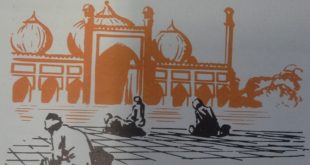Thirteen and a half centuries ago a new religion began in Arabia. Today millions of people are followers of this religion. It is called Islam and its followers, Moslems. All their lives long, Moslems must pray, in ways clearly prescribed, five times every day. No ordinary event must be allowed to interfere with these moments of prayer. Moslems must learn to recite their creed — a long statement of their religious belief. For one month each year they must fast all of every day from sunrise to sunset. They must give generously to charity. They should, if at all possible, …
Read More »Tag Archives: Damascus
The Crusades 1096-1260
ON A COLD NOVEMBER DAY IN 1096, a great crowd of people gathered in a field at the town of Clermont in France. They had come from miles around and near them were pitched the tents they had put up for shelter. For some days, Pope Urban II had been holding a great council of cardinals, bishops and princes. Today he was to speak to the people and so many wanted to hear that no building was large enough to hold them all. A platform had been built in the center of the field and as Pope Urban stepped up …
Read More »Seljuks and Mamelukes A.D. 950-1517
LIKE THEIR relatives the Mongols, the Turks began as wandering herdsmen in Central Asia. Their first contact with Islam was as victims rather than victors. When Arab armies overran the southern part of their homeland in the eighth century, many Turks were captured and enslaved. Recognizing their talent for fighting, their new masters enrolled them in their armies. In time, many of them reached high positions in the lands of their adopted religion. About the middle of the tenth century, tribesmen from Turkistan, led by a chief named Seljuk, settled near the city of Bokhara. There they became converted to …
Read More »The Abbasids: Glory and Decay 750 -1258 A. D.
UNDER THE Omayyads, who ruled from 661 to 750, Islam had grown into a mighty empire. Arabic had become its language, while the Arabs, in turn, had picked up useful skills from the peoples they had conquered. The state had grown rich from the tribute paid by non-Moslems and the land tax paid by landowners. Though the caliphs were mainly concerned with pleasure and power, they had not neglected religion completely. They had built the Dome of the Rock in Jerusalem and the Omayyad Mosque in Damascus — two magnificent sanctuaries which were the holiest places in Islam after the …
Read More »Cracks in the Wall of Islam A.D. 656-750
THE FIRST three caliphs — Abu Bakr, Omar and Othman — had all known — Mohammed well. In 656, Othman, an old man in his eighties, was stabbed to death by a band of rebels. They believed that the right to be caliph belonged to Mohammed’s son-in-law, Ali. Sometime later, Ali defeated his rivals for power in battle and proclaimed himself caliph. Instead of Medina, he chose as his capital the new Arab city of al-Kufah, in Iraq. All but one of the leaders of Islam swore loyalty to Ali. The exception was Muawiyah, the governor of Syria, who set …
Read More »The Holy Book of Allah A. D. 632-732
Mohammed sometimes dictated his thoughts to his secretary, Zayd, but when he spoke in public no one wrote down what he said. Instead, his listeners learned his speeches by heart and mistakes crept in, as they usually do. Only a short time after Mohammed’s death people were repeating his sayings in quite different ways. If Mohammed had been anyone else, this would not really have mattered. It would have been enough to remember what he had said without bothering too much about how he had said it. But the Moslems believed that God himself had addressed them through Mohammed. Every …
Read More »Paul of Tarsus A. D. 35 – 64
THERE was one man who had more to do with the future of the Christian church than even the apostles themselves, and his name was Paul, or Saul in Hebrew. He was the greatest of all Christian missionaries. Much more is known about Paul than about other leaders of the early church, for he wrote or dictated long letters of instruction and encouragement to various missions he had established. These letters were called epistles. A number of them were preserved and published. In addition, most of the Acts of the Apostles, the fifth book of the New Testament, deals with …
Read More »





